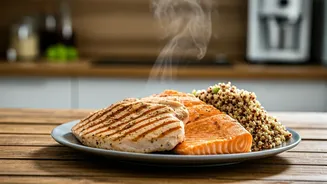Protein's Vital Role
Protein is a fundamental nutrient, playing a crucial role in building and repairing tissues, making it a cornerstone for muscle growth and maintenance,
especially for women over 35. It provides the building blocks for muscle fibers, helping to counter the natural decline in muscle mass, known as sarcopenia, that occurs with age. Protein also supports metabolic processes, enhances satiety, and aids in weight management by keeping you feeling fuller for longer, which can prevent overeating. Furthermore, adequate protein intake can improve bone health, as it is a key component of bone structure and strength, therefore reducing the risk of fractures and osteoporosis, particularly prevalent in postmenopausal women. The significance of protein also extends to hormonal balance and immune function, both critical for overall health. Consuming enough protein is a proactive measure to improve not just physical performance, but also to facilitate healthy aging.
Top Protein Sources
Incorporating protein-rich foods into the diet is essential for achieving fitness goals. Several excellent sources are readily available and should be included in daily meals. Lean meats like chicken breast and turkey are excellent choices, providing high protein content with minimal fat, supporting muscle development. Fish, such as salmon and tuna, are not only packed with protein but also rich in omega-3 fatty acids, which boost overall health. Eggs are another great option, being a complete protein source, offering essential amino acids needed for muscle repair and growth. For vegetarians and vegans, plant-based options are equally effective. Lentils and chickpeas are excellent choices, providing protein, fiber, and various vitamins and minerals. Tofu and tempeh, made from soybeans, are versatile and can be used in numerous recipes, giving a significant protein boost. Dairy products, like Greek yogurt and cottage cheese, are not only great sources of protein but also provide calcium, important for bone health. Nuts and seeds, such as almonds, chia seeds, and pumpkin seeds, are convenient snacks that offer a good amount of protein and healthy fats, aiding muscle recovery. By including a mix of these sources, women over 35 can ensure they meet their protein needs and support their muscle-building efforts.
Meal Planning Strategies
Planning meals strategically is key to ensuring adequate protein intake throughout the day. A well-planned approach involves incorporating protein in every meal to keep the body consistently supplied with the nutrients it needs. Begin the day with a protein-packed breakfast, such as eggs with whole-grain toast or Greek yogurt with berries and nuts. This sets the tone for the day and boosts metabolism. For lunch, consider options like a chicken salad with mixed greens, a lentil soup, or a tofu stir-fry, all offering a good dose of protein and essential nutrients. Dinner is an excellent time to enjoy lean meats, fish, or plant-based proteins, such as a salmon fillet with quinoa or a tempeh and vegetable curry. Snacks should also include protein sources. Good choices include a handful of almonds, a protein shake, or cottage cheese with fruit. These snacks fill the gap between meals, keeping hunger at bay and maintaining a steady supply of amino acids for muscle repair and growth. Portion control is also important. Ensure the protein portion is appropriate to your body weight and activity level, typically around 20-30 grams per meal. Preparing meals in advance can streamline the process, as it makes it easy to stick to dietary goals, even on busy days. Planning meals and snacks ensures you consistently consume enough protein to support your muscle-building and overall health objectives.
Optimizing Your Diet
Beyond simply including high-protein foods, optimizing your diet involves several key considerations. Focusing on nutrient-dense foods is paramount. This means selecting foods that offer the maximum amount of nutrients per calorie, such as whole grains, fruits, and vegetables. These foods provide essential vitamins, minerals, and antioxidants, supporting overall health and making protein intake more effective. Hydration is also a crucial aspect. Drinking sufficient water supports various bodily functions, including muscle recovery and metabolism. It is recommended to drink water throughout the day, especially before and after workouts. Combining protein intake with regular exercise is also important to support muscle development and fitness goals. Incorporate strength training exercises at least two to three times per week, focusing on compound exercises. Consider also incorporating adequate rest and recovery. This enables muscle fibers to repair and grow. This means getting enough sleep, reducing stress, and allowing your body to recover after intense workouts. A well-rounded approach ensures the maximum benefits from high-protein food choices, resulting in enhanced muscle mass, improved overall health, and a more active lifestyle.















